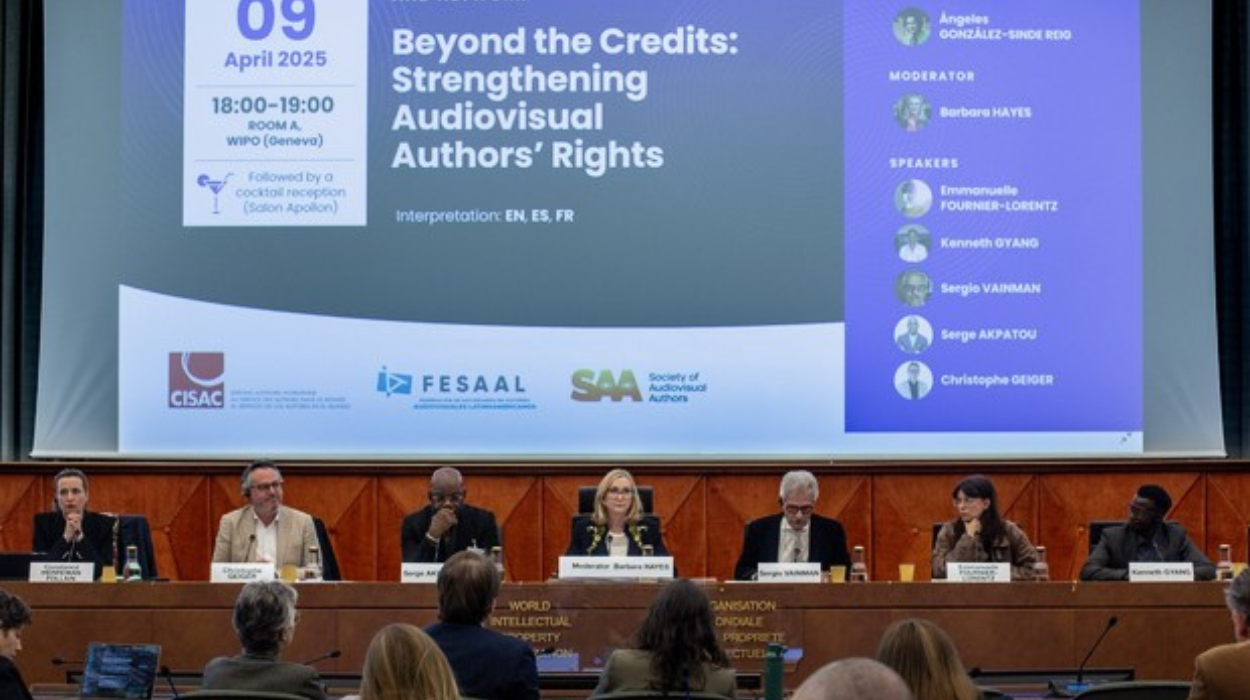On April 9, 2025, the World Intellectual Property Organization (WIPO) hosted a pivotal event titled “Beyond the Credits: Strengthening Audiovisual Authors’ Rights” in Geneva. The event, which was organized in collaboration with the International Confederation of Societies of Authors and Composers (CISAC), the Latin American Audiovisual Authors Societies Federation (FESAAL), and the Society of Audiovisual Authors (SAA), focused on the global challenges concerning the rights and remuneration of audiovisual creators, including screenwriters and directors. The session brought together experts, policymakers, and creators from across the world to discuss how copyright laws and fair compensation can better support these creators, especially in the rapidly evolving digital landscape.
Read Also: German Investigation launched against Palestinian Territories for corruption and funds embezzlement
The Core Issues: Lack of Fair Remuneration and Protection
One of the central themes of the WIPO event was the unfair treatment faced by audiovisual authors despite their central role in the creative process. Moderated by Barbara Hayes, Chief Executive of the Authors’ Licensing and Collecting Society (ALCS) in the UK, the session featured various prominent figures from the industry, including screenwriters and directors from three different continents.
Constance Herreman Follain, Director of Legal and Public Affairs at CISAC, opened the discussion by emphasizing that screenwriters and directors are at the heart of the creative process. However, in many countries, their economic and legal protections do not reflect their critical contributions, particularly in a world increasingly shaped by digital streaming platforms and artificial intelligence (AI).
Ángeles González-Sinde Reig, a screenwriter, director, and vice president of CISAC, further illustrated the gravity of the situation, stating that while screenwriters and directors create top-tier content, they are often treated as second-class citizens in terms of legal protection and remuneration. She pointed out that the rise of AI and the domination of streaming services have only exacerbated these pre-existing challenges.
Personal Testimonies from International Creators
The event featured testimonials from creators around the globe, each sharing their personal experiences with the current state of copyright laws and remuneration systems. Swiss screenwriter Emmanuelle Fournier-Lorentz, who began her career in 2018, revealed that screenwriting is one of the least secure and poorly paid jobs in the Swiss cinema industry. She explained that despite minimum wage laws, they are rarely enforced, and many creators find themselves working for far below industry standards.
Fournier-Lorentz recounted her own experience, where she was offered minimal pay for nine months of work and had to negotiate for four months just to secure a slight increase in her salary. She expressed disappointment that even after years of work, the economic conditions for creators in Switzerland have not improved, as wages have remained stagnant since 2011.
Meanwhile, Nigerian screenwriter and director Kenneth Gyang shared how the situation is even worse in Africa. He noted that in many African nations, national copyright laws do not provide audiovisual authors with any remuneration rights. As a result, many creators in Nigeria are leaving the industry, unable to sustain a career without the ability to earn a fair living from their work.
Sergio Vainman, an experienced Argentinian screenwriter with over 50 years in the industry, also spoke about the often exploitative contracts that undervalue the creative contributions of screenwriters and directors. He recalled seeing contracts where authors are forced to sign away all rights to their work, including the ability to modify or adapt it, with no financial or legal recourse. These contracts often grant producers full control over the work in perpetuity, without limitation on time, territory, or media platforms.
Legal and Policy Solutions for Audiovisual Authors
During the event, various legal experts and policymakers discussed potential solutions to these systemic problems. Christophe Geiger, a professor of law at Luiss Guido Carli University in Rome, highlighted a recent European Commission study that revealed that 51% of audiovisual authors believe their remuneration is rarely fair, and 33% feel it is never fair. He proposed that instead of relying solely on copyright contracts, authors should be entitled to statutory remuneration rights, which would provide them with a guaranteed fair share of earnings from the exploitation of their work.
Geiger also pointed out that some countries, such as Italy, Spain, Germany, and Poland, have successfully implemented systems that ensure fair remuneration for creators, including mandatory collective management systems. He suggested that a comparative study of these systems could help identify best practices and inform future policy decisions.
Conclusion: The Need for Global Action
The WIPO event concluded with a call to action for greater protection of audiovisual authors’ rights on a global scale. Moderator Barbara Hayes encouraged delegates to support the idea of a study on audiovisual performances as proposed by the Ivory Coast delegate. This study, along with other proposed actions, could help policymakers and industry stakeholders better understand how to address the widespread issues of underpayment and exploitation faced by creators in the rapidly changing digital world.
The event served as an important reminder that despite the crucial role that screenwriters and directors play in the entertainment industry, their rights and remuneration continue to be neglected in many parts of the world. The dialogue at WIPO is a crucial step toward changing that, but much work remains to be done to ensure that creators are given the legal protections and fair compensation they deserve.
This article is originally published on: cineuropa









